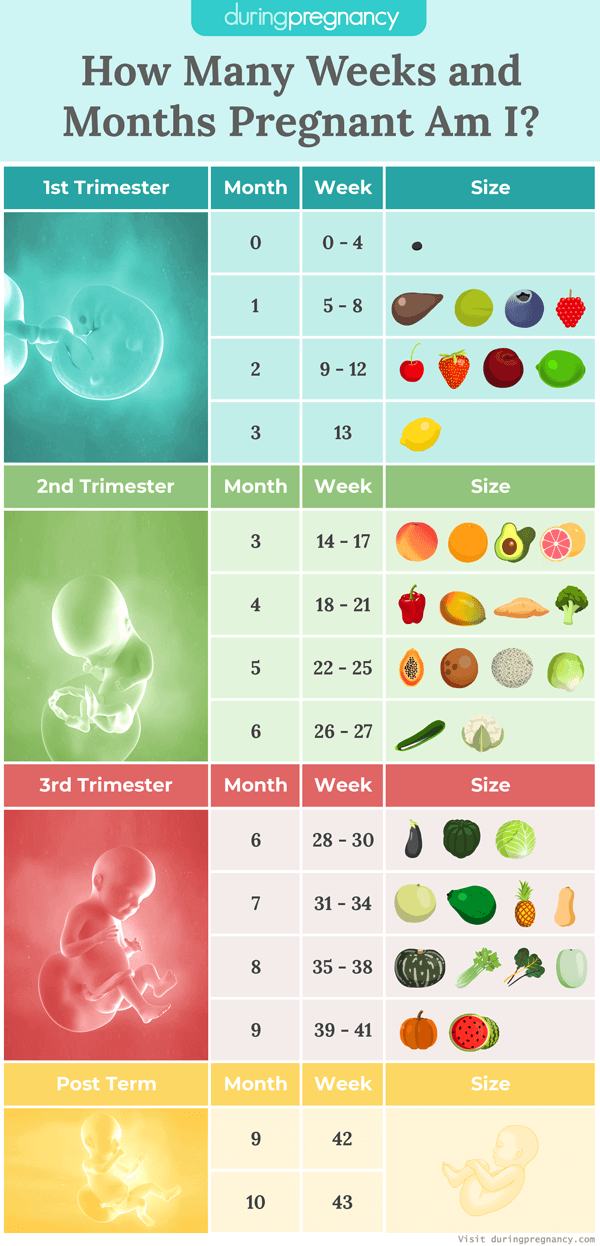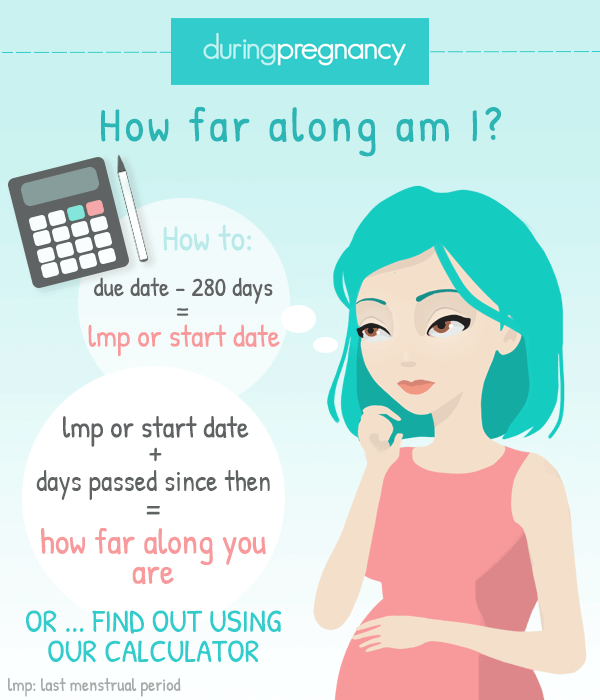
Pregnancy is most commonly measured from a woman's last menstrual period to birth and is known as gestational aging. How far along you are (gestational) is measured by counting the weeks that have passed since the first day of your last menstrual period (LMP).
There are several different starting dates to count pregnancy from:
- Conception or ovulation
- Last menstrual period (gestational)
- Measurements from an ultrasound
- IVF Transfer date
If you require more options to calculate your due date or how far along you are, try our due date calculator.

How Long is Pregnancy?
Pregnancy is estimated to be 40 weeks or 280 days from the first day of a woman's last menstrual period (LMP).
Pregnancy is estimated to be 38 weeks or 266 days from conception.Actual Length of Pregnancy
The actual length of pregnancy varies significantly among women. Just 4% of babies are born on their estimated due date, while 70% are born within ten days. The remaining 30% are born more than ten days before the due date or more than ten days after.[2]
The reference above provides a delivery birth range of 38 weeks and four days (270 days) to 41 weeks and three days (290 days) with a probability of 70%.
No LMP Date?
If you don't have a valid last menstrual period date for any reason, your doctor will provide one for you, most likely based on ultrasound measurements.
Irregular Period
Irregular menstrual periods are generally calculated by early ultrasound.
Generally, obstetricians or physicians initially calculate pregnancy from your last period without adjusting for an irregular cycle length. This initial estimation may then be superseded or confirmed by an ultrasound[3].
Read more about ultrasound on this page or our due date page.
Why Pregnancy is Counted from the Last Menstrual Period (LMP)
Pregnancy is counted from a women's last menstrual period because the start of a period is easily observable and usually known to a woman whereas the date of conception is much less likely to be known.
Historically, the first day of the last menstrual period (LMP) became the date from which pregnancy is counted even though conception occurs about two weeks later.
The LMP formula is good for working out an initial age of pregnancy but ultrasound is more accurate.[1] The age of pregnancy may be revised following your ultrasound scan.

How to Calculate How Many Weeks You Are
- Start by counting the recurring day of your last menstrual period
- Stop counting recurring days when you reach the present time.
- The number of recurring days you count is the number of weeks you are now.
If your last menstrual period started on a Wednesday, count one week to the next Wednesday. Now keep counting Wednesdays until you reach the present date.
LMP = December 2, 2025
Current Date = February 4, 2026
Calculation:
1st Wed = December 9, 2025 = 1 Week
2nd Wed = December 16, 2025 = 2 Weeks
9th Wed = February 3, 2026 = 9 Weeks
You are 9 Weeks and 1 Day pregnant
Another method to calculate how many weeks pregnant you are is to:
- Count the days from the first day of your Last Menstrual Period (LMP) until you reach today's date.
- Now divide the counted days by 7.
- The answer will be how many weeks you are now.
(LMP + Days Passed Since LMP) / 7
LMP = Last Menstrual Period
LMP + Time Passed = How Far Along I Am (Gestational)
LMP = Last Menstrual Period
*LMP date may be adjusted if unknown or following ultrasound.
Each of these methods will give you the gestational age of your pregnancy.
Using Ultrasound
Ultrasound in the first trimester is the most accurate method of dating pregnancy.[1][3] During the scan, baby is measured and the age of pregnancy is estimated by comparing baby's size against recorded averages. If there is a significant difference between gestational age according to LMP and gestational age according to the ultrasound, you may be given a new gestational age and due date based on the ultrasound measurements.[1]
Your pregnancy may also be dated by ultrasound measurement if an LMP formula was not appropriate for your pregnancy for any reason. LMP formulas are not suitable in several situations including the following: LMP is not known or is not certain, birth control pills were taken in the two months before LMP, the menstrual cycle is irregular, you are carrying multiples (twins or more).
Although the age of pregnancy based on ultrasound measurements is more accurate than the age of pregnancy based on LMP, both are estimates and not definitive statements.
Dating Pregnancy Using hCG Testing
The age of pregnancy can also be estimated by measuring the levels of hCG (Human Chorionic Gonadotropin) in the mother's blood. The results of this test indicate how far the pregnancy has progressed. Home pregnancy tests are available which can be used in the early stages of pregnancy to measure pregnancy progress.
Other Methods of Pregnancy Dating
Other, less important methods (used by health professionals) for assessing the age of pregnancy include measurement of fundal height (size of mother's belly), the age of baby's first heartbeat, and time when mom first feels baby's movement.
Disclaimer About the Calculator
Our calculator strives for the highest accuracy, but your pregnancy progress may differ from the calculator's results for several reasons including possible miscalculation; errors in input data; individual variations in the timing of ovulation, and/or conception.
The information provided regarding pregnancy progress and fetal development is a guide through the weeks. It is not specific information for a specific individual but serves as a general guide only. As each pregnancy differs, any dates, weights, and lengths should be considered general information for interest only.
Our week-by-week guides use both standard and metric units of measure including pounds and kilograms.
References
- Committee Opinion No 700: Methods for Estimating the Due Date. Obstet Gynecol. 2017 May;129(5):e150-e154. [PubMed]
- A. Jukic et al. Length of human pregnancy and contributors to its natural variation. Human Reproduction 28 (2013): 2848 2855. doi: 10.1093/humrep/det297
- Committee Opinion No. 688: Management of Suboptimally Dated Pregnancies. Obstet Gynecol. 2017 Mar;129(3):e29-e32. [PubMed]
Recently Added Dates
December 21, 2025
How many weeks am I if my due date is
December 22, 2025
How many weeks am I if my due date is
December 23, 2025
How many weeks am I if my due date is
December 24, 2025
How many weeks am I if my due date is
December 25, 2025
How many weeks am I if my due date is
December 26, 2025
How many weeks am I if my due date is
December 27, 2025
How many weeks am I if my due date is
December 28, 2025
How many weeks am I if my due date is
December 29, 2025
How many weeks am I if my due date is
December 30, 2025
How many weeks am I if my due date is
December 31, 2025
How many weeks am I if my due date is
January 1, 2026
How many weeks am I if my due date is
January 2, 2026
How many weeks am I if my due date is
January 3, 2026
How many weeks am I if my due date is
January 4, 2026